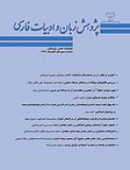شاهنامه در جهان عرب
محورهای موضوعی : Research in Iranian classical literatureقاسم مختاري 1 , محمود شهبازي 2 , مژگان نصيري 3
1 -
2 -
3 -
کلید واژه: فردوسی شاهنامه ادبیات عربی,
چکیده مقاله :
فردوسی شاعر بلند آوازة ایران زمین است که با سرودن شاهنامه بهعنوان یکی از گرانسنگترین آثار حماسي، در آسمان شعر و ادب فارسی درخشید. در قرن هفتم هجري، نخستین ترجمة عربي از شاهنامه توسط فتح بن علی بنداری اصفهاني، به فرمان ملك معظّم عيسي ايوبي انجام شد. این ترجمة منثور و مختصر كه جنبة هنري و زيباشناختي شاهنامه را وانهاده بود، تا دورة معاصر در ادبیات عربی تأثیر چشمگیری نداشت؛ اما در دورة معاصر و به فضل تلاشهاي بيوقفة برخي از ناقدان و نويسندگان جهان عرب، از جمله عبدالوهاب عزّام كه به زبان فارسي تسلط داشت و پژوهشهاي گستردهاي در زمينة شاهنامه به زبان عربي انجام داد، برخي شاعران و اديبان معاصر عرب تحت تأثير فردوسي قرار گرفته و او را الگو و اسوة شعري خود قرار دادند و از فردوسي بهعنوان شاعري بزرگ و الگويي بي همتا ياد كردند؛ اما داستانهاي شاهنامه در آثار شاعران عرب چندان بازتابي نداشت، كه گرايش به ادبيات غرب، ترجمة منثور و از بين رفتن ويژگيهاي ادبي آن در ترجمه و فراهم نبودن زمينة حماسه در ادبيات عربي از دلايل آن است.
Firdowsi is the famous Iranian poet who, by composing the epic of Shahnameh (The Book of Kings), secured a prominent place for himself in Persian literature. The first Arabic translation of the book was made in the 7th century A.H. by Fath Ibin Ali Bondari Isfahani by the decree of Malek Mo’adham Issa Ayoubi. However, the translation being in prose and consequently ignoring almost all the aesthetic aspects of the book, had literally no influence on Arab writers. In the current century and thanks to the indefatigable attempts of some Arab writers and critics, such as the prominent Arab scholar Abd-al-Vahhab Izam who also knows Persian very well and has conducted many researches on Shahnameh in Arabic, Shahnameh has found its place among Arab authors and poets who confessed the greatness of Ferdowsi’s unique work. However, the stories of Shahnameh did not reflected that much in Arabic poetry. There may be three reasons for this fact: tendencies to western literature, prose translations of shahnameh where its poetic features have been lost, and the lack of an epic heritage in Arabic literature.


